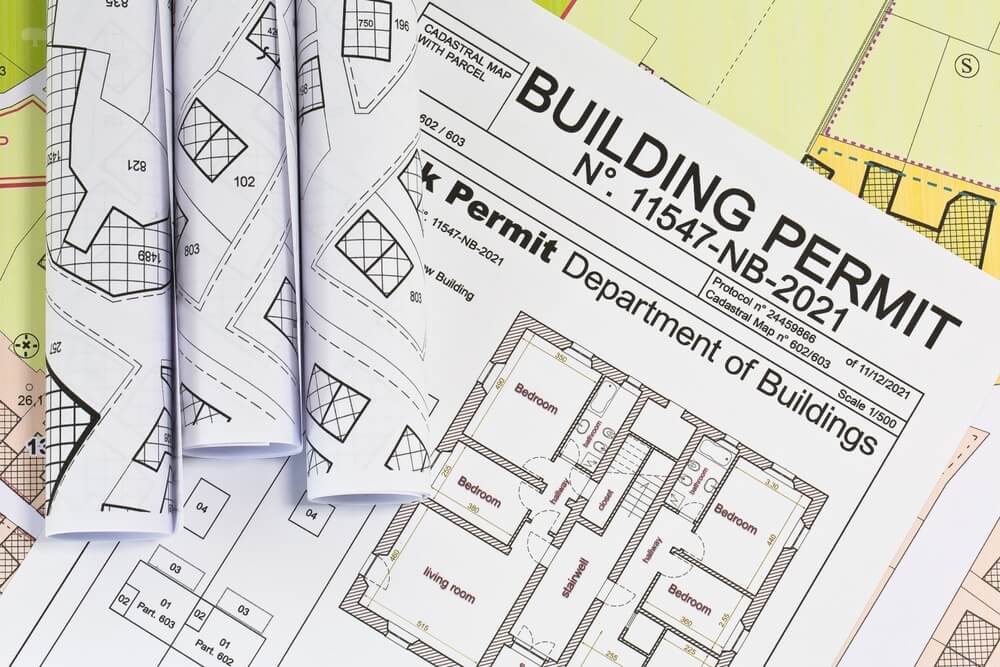Nothing takes the fun out of home improvement like paperwork. While the thought of getting a residential building permit in Pennsylvania may be daunting, it doesn’t have to be! Use this guide as a resource as you begin your project. We explain the importance of building permits, outline the process to get one, and link to resources for all the counties we serve.
What Are Permits, and Why Are They Important?
Building permits are written approval granted by your local government, giving you permission to complete construction or renovation projects. Permits exist to ensure that all work is safe and legal. You must have an approved permit before any construction begins.
Building permits rely on local building codes, a set of rules and standards that you must meet to complete construction. This ensures safety and quality in every build. In Pennsylvania, all construction must follow the Uniform Construction Code (UCC).
Each municipality is tasked with enforcing the UCC. Some may have local amendments they’ve added with additional home construction regulations. However, some municipalities may have opted out of enforcing it. In this case, all permits will go through the state with the Department of Labor & Industry. Contact your local building office to get more details.
Building Permit vs Zoning Permit
A building permit guarantees that the construction meets all safety codes. It focuses on technical areas like electrical and plumbing, along with structural integrity and fire safety.
Zoning permits ensure that your upcoming project doesn’t go against land-use regulations. Your zoning district determines what you can and cannot do with your land. You need a zoning permit for most work, including building new structures, additions, driveways, fences, signs, and more.
Zoning approval is typically not needed for interior remodeling, as long as it doesn’t expand or change the use of your existing space. However, some townships are starting to require zoning reviews even for interior work. Always check with your municipality to be sure.
Zoning permits are usually reviewed first in the process, but it’s up to your township if they want to review both applications in tandem. Usually, we submit zoning and building permits together, then the township processes the zoning review first, before moving onto the building review.
When Do You Need Residential Building Permits?
Residential building permits are required for most projects, including:
- New Construction — If you’re building a brand new residential structure.
- Additions — If you’re expanding your existing home. This includes adding a sunroom, in-law suite, or attached garage.
- Structural Changes — If your work will affect load-bearing walls, exit paths, or the structural integrity of the building.
- New Windows and Doors — If you’re adding any new windows and doors or changing their size (bigger or smaller).
- Major Repairs — If you’re planning a roof replacement or anything that involves mechanical, electrical, HVAC, or plumbing changes.
- Decks — If your deck has any sort of roof or covering, or is more than 30 inches above the ground at any point. NOTE: Decks of any size almost always need a zoning permit.
- Fences — If your fence is over six feet tall, or for some locations, any fence at all. (NOTE: a zoning permit is typically required for all fences).
- Retaining Walls — If your retaining wall is four feet high or more.
- Swimming Pools — If you’re building any in-ground pool or an above-ground pool that’s 24+ inches deep.
- Accessory Structures — If you’re building detached structures like a shed or garage over a certain square footage (depends on your location).
- Demolition — If you’re doing a partial or complete demolition of a residential structure.
- Siding — If you’re doing siding replacement or repair, depending on your municipality.
Building permits are NOT typically required for the following:
- Minor Interior Updates — If you’re painting, changing wallpaper, or doing other cosmetic alterations.
- Small Decks and Fences — If you’re building an uncovered deck that’s less than 30 inches high, or a fence smaller than six feet.
- Driveways and Sidewalks — If these are no more than 30 inches above grade and not built over a basement.
While a building permit usually isn’t needed for these projects, a zoning permit might be. Driveways, sidewalks, and concrete usually require zoning permits at minimum, sometimes additional approvals like a stormwater management plan.
The specifics, of course, depend on your local home construction regulations. Consult with your municipality to determine exactly what kind of permits and approvals your work requires. For more exemptions, explore the Pennsylvania Code.

The Residential Building Permit Process
The best part of the permit process? KSW handles it for you. Before a project begins, you can sign off giving us permissions to act as your agent.
We still encourage every homeowner to do their own research, but you don’t have to get bogged down in the details. In fact, it can get messy if you apply for a permit on your own and then later decide you want us to do it for you. To keep processing simple and help your township out, let us do the paperwork.
The PA building permit process and timeline differs significantly for every township and project. This is a general overview of some of the steps that go into acquiring a permit (building or zoning). Certain work may require additional permits that are not listed here.
Step 1: Contact your local municipality to confirm permit requirements.
Explore our resource below to find your municipality’s website. From there, you can contact the office to determine exactly what permits and approvals you’ll need before you begin construction. This is also where you will learn whether your municipality enforces the UCC or if you need to go through the state.
Step 2: Complete the UCC-3 residential building permit application.
You can do this online or pick up a physical copy from your local planning/zoning office. In Pennsylvania, if you’re using a contractor like KSW Construction LLC, you’ll need their Home Improvement Contractor’s (HIC) Registration number, along with other details like project cost and scope.
Step 3: Gather additional documentation.
Along with your application, you’ll need additional documents depending on the project. Examples include: multiple sets of sealed architectural drawings and other construction plans, your contractor’s license, site plans, zoning approvals, well and septic permits, energy compliance reports, and plumbing/electrical/HVAC permits.
Get a list of the exact requirements when you contact your municipality.
Step 4: Submit all materials.
Many areas allow for electronic submission. Send your application and additional documentation to your local building official or the approved third-party reviewer.
Step 5: Wait for the project to be reviewed.
This is done by your local building official or a third-party agency. The exact timeline is subject to change based on your municipality’s permit load and any additional paperwork needed. For a residential building permit, 15 days is typical (30 for commercial). However, this number can fluctuate. For example, the City of Lancaster is currently over 30 days for a residential review.
Once your permit is processed, a reviewer will submit comments if you need to make any changes. More complex projects may need additional reviews for engineering, stormwater, or beyond.
Step 6: Pay the permit fee upon approval.
Once approved, you’ll be notified via email. Then you will have to pay the permit fee, including a state surcharge. The schedule and amount varies by location and permit type. After that, your permit will be issued and construction may begin.
Step 7: Schedule inspections.
You’ll be notified of any necessary inspections for different phases of construction. You are responsible for scheduling these at the proper times. Once the project is complete, set up a final inspection. From here, you’ll receive a Certificate of Occupancy if it’s required.
This is for projects where a new living area was added (decks, additions, new builds, garages, etc.). It is not needed for roofing, siding, fences, and similar projects. Keep this certificate for your records to prove that your building meets local building codes.
Helpful PA Building Permit Resources By County
Get started with the PA building permit process by contacting your municipality. Not sure which county or municipality you live in? Use this handy tool from the Pennsylvania Department of Community and Economic Development.
Once you have this information, find your county below and click on the link. From there, you can locate your borough or township and head to their website to contact them with your permit questions and download the application.
- Adams County
- Berks County
- Bucks County
- Chester County
- Cumberland County
- Dauphin County
- Delaware County
- Lancaster County
- Lebanon County
- Montgomery County
- York County
Get Help With the Permit Process
Here at KSW Construction, we can assist all our clients with their residential building permits. Code compliance makes permitting one of the longest parts of the renovation process. But with KSW as your partner, it’s easy!
If you’re overwhelmed by all the details, don’t sweat it. We’re experts in the permit process so you don’t have to be. Once you give us permission to act as your agent, we can apply for all the permits you need so nothing falls through the cracks. Contact our team to get started today.
Have a project in mind that requires a permit? We can help!

